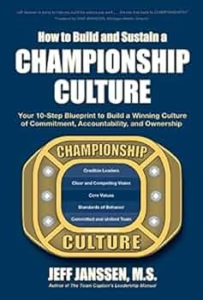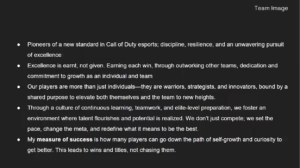Your 10-Step Blueprint to Build a Championship Culture

by Jeff Janssen
Winning isn’t an accident.
It’s the result of a culture you build with intention, not just one you inherit.
Over time, I’ve realized that not everything can or should be applied, but some key takeaways have truly resonated with me. To save you time, you might be interested in the biggest learning I’ve taken away from the hours I’ve put in. (I won’t cover everything – Only some key concepts that I related to)
CULTURE IS KING.
“As a leader, you are responsible for creating a winning culture that drives behavior and produces winning results. It’s not someone else’s job. It’s your job!” – Ohio State Football “Urban Meyer”
For you readers, think about the best environments you’ve been a part of. Competitive, work, education. These are environments where usually it results in highly productive, passionate, purposeful and people-centered culture. A place where you WANT to work hard every day, where you’re fully engaged, committed to something bigger than yourself. An environment were you play and work for each other, where you take immense pride for your team. An environment that holds people accountable to be the best, where you don’t tolerate mediocre excuses. You challenge and support each other through thick and thin. You expect to win and you have that burning desire to win. That was the environments we created in 2022 – 2024. Where the season ends, and you don’t want it to finish.
Think about the opposite………
More often than not, most of you reading have been a part of the opposite. CDL players / esport Pro players, i know you know what I’m talking about. An environment where you hate your boss or coach. An environment where people are selfish, only caring about themselves. Only caring about their spot or role in a job. Where they skip corners, turn up late. Only doing the expectation when people are watching, never above and beyond. Losers complain and wait for the perfect environment to present itself, however winners change the environment they are in. Think of an environment where you have cliques, where there is drama, and division within the camp. Think about an environment where you HATE to wake up and be a part of. Players who actively try to sabotage from within. Sounds miserable. This is a corrosive culture.
We’re humans, purely the motivation and fire to win alone doesn’t cover the consistent cracks of the above.
Most cultures are somewhere inbetween.
Winners have a certain way of doing things….
As a coach, i have studied for years on what makes winners, winners. Why the successful are successful. From individuals to teams. You look at any long-term elite program, and there are consistent traits on how they do things. They might call it different things but, it’s all essentially the same blueprint and foundation. That “particular” way is the foundation for success and it is embodied, embraced and enforced by EVERYONE on the program. From the CEO’s to the cleaners.
This “well defined particular way” dictates how people should act, train, compete and conduct themselves – daily. Remember my previous journals, it’s the process that leads to wins. That particular way optimizes the process. It doesn’t mean you WILL win but, you’ll reach excellence and your best. At the very least.
“I moved forward methodically with deep belief that the many elements of my Standard of Performance would produce that kind of mindset, an organizational culture that would subsequently be the foundation for winning games. The culture precedes positive results. It doesn’t get tacked on as an afterthought on your way to victory stand. Champions behave like champions before they’re champions; they have a winning standard of performance before they are winners. ” – Bill Walsh, San Fran 49ers.
This quote embodies culture. I developed my own standard of performance from above. What the day to day looks like. Working with the likes of Crimsix, i saw first hand what actions are conducive to winning and what take away from that. Combine that with a standard of performance that aligns with the programs overall vision, values and philosophy. On NYSL, that was crystal clear. Everyone on the same page. Even in failure (2025), it teaches you what works and what doesn’t work. It re-enforced my beliefs on the standard of performance you need to have for any competitive team.
“Culture, in the NFL sense, means creating a wining environment based on shared beliefs and practices. In this century, no NFL franchise has spent more time on the concept of culture than the New England Patriots. With three Super Bowl championships, they have become a model for changing the culture of a franchise. Head Coach Bill Belichick has educated all who work for him to cultivate a team that believes in one common goal – winning. It’s a process, that takes vision and a plan.”
Obviously, that standard of performance is different based on what you do. COD, different to LoL, different to football and so on.
Your Way Is Your Culture….
Ask yourself this
- What is your way of training?
- What is your way of competing?
- What is your way of representing your program?
- How well is that program working for you?
- How well does your way represent your vision, values and standards?
Culture is the foundation for anything that requires competition; esports, sports, business. In the business world, they talk about the corporate culture.
What actually is culture?
It’s simple and complex. Simply, it’s how things are done in your program. It sounds straight forward but, it is a very nuanced and complex topic. It encompasses virtually everything you do – your goals, values, philosophy, beliefs, expectations, day to day, feedback, leadership, accountability, standards, discipline and so on….
Culture is demonstrated and reinforced in what is considered acceptable and unacceptable in your program. For me, these are my standard of performance and have actions tied to them. You break the standard of performance, you are held accountable.
The various levels of culture;
- vision for where you would like to go and what you want from the program
- stated and unstated expectations of everyone
- standards of behavior both on and off the playing field
- programs belief system – what’s acceptable or not
- way you treat and relate to each other
- discipline for those that violate it
- selecting team mates and empowering leaders.
Culture has a HUGE impact on the chances of success – what ever that looks like. It affects your reputation, your recruiting, satisfaction levels and your significance.
The way to describe culture, is like an aquarium. It’s something you maintain, daily. It’s largely invisible but, it has life-supporting qualities. These qualities affect whoever lives in this aquarium. If your aquarium is dark and murky, you die. If it’s fresh and clean, you thrive.
Your culture is also your programs behavioral bandwidth. Meaning, what type of S**T are you willing to accept and most importantly, not accept. That is your guide to bring the best out of those in the program. You reward positive actions you want, and you discipline those you do not. Obviously, this will vary based on the nature of the culture. For example typical MMA culture is significantly different than culture of those in F1. You can’t go round hooking people.
You either coach and correct these unacceptable behaviors, or you kick them out entirely. It’s a lot harder said and done in the COD community, as talent is so few and far between when compared to traditional sports. You might have a T5 talent who’s crazy. This for me, is the most difficult thing to deal with in COD. To NYSL credit, they always gave the power to the staff who re-enforced and drove the culture – daily.
8 types of culture
Generally speaking, there are 8 types of culture you will find.
- Corrosive culture – we’ve discussed this one before. I know a lot of my CDL pros know about this one. This culture is characterized by negativity, frustration, cliques, gossiping, distrust and selfishness. A work environment where you can feel the tension. Think about NYSL Vanguard early in the season. From a relationship stand point, you’re just team mates. You just tolerate the guys. You spend more time in these political games with your “team mates”. No one on the same page. Your individual goal or spot is all that matters. Lack of team accountability, dysfunctional, and you don’t trust each other. Survival, that’s it. Chalk it up.
- Country club culture – a culture where your entitlement, appearance and leisure is all that matters. Look good instead of doing good. Superficial and soft. These are the cultures where you don’t want conflict. You’re scared of calling each other other or being blunt. Politics, popularity, payoffs. Relationships are superficial and a need basis.
- Congenial culture – a culture where you are just purely getting along. More of a support club and social club. No drive, no goals, nothing. Just pure vibes. This is what people thought NYSL was. Just smiles and waves. You know the saying “participation trophy”? This culture is the definition of that. And that’s okay if you’re knitting with grandmas on Wednesday. Not so much if you want championships. You try not to hurt each others feelings. You can’t improve without it. People are fake, and not honest with each other. It’s very much candid.
- Competitive culture – very strong focus on results and less so on relationships. Team members spend most of their time competing with each other, coaches attention or leadership roles. Competition is necessary but, what this does is take that to the extreme. It inhibits and destroys any relationships you have. You want to be competitive but, you also want to be creative, bold, collaborate and positively push each other. Not pushing each other out of spite or to one up each other.
- Comfortable culture – results and relationships are moderate importance. Sure, there are some standards. Some of them are interested in following it. You’ll train to a certain level but, you want push yourself into an uncomfortable zone. That’s where growth happens. Team generally gets along but, there are not deep relationships. There’s no collective sense of mission between team mates. It produces moderate and mediocre results. You’re more so acquaintances rather than mentors or close friends when all said and done.
- Cut throat culture – results remain supreme. Imagine investment banking or any similar field. High pressure, high stakes. It’s merciless and unforgiving. Character and people skills are neglected, winning is all that matters. If you can get the job done, cool. You’re selfish, you have character flaws, you might have off field antics or a poor attitude. Doesn’t matter. Ends justify the means. Relationships are purely transactional. Business is business. Don’t perform, you’re gone. This type of culture is a paradox. The more you fear something, the more likely it’s to happen. The more you chase, the less likely it’s to happen.
- Constructive culture – good balance between focus on results and relationships. Team members are committed to winning. Most will put the hard work in to win. Team mates strive to get along and develop solid bonds with each other. It’s not highly intense, however.
- Championship culture – premium on both results and relationships. Strong sense of mission and purpose. They know exactly what they want, how they want it. With a burning desire to achieve it. That obsession and relentlessness. Fully designed and fully aligned. Very high standards. Championship cultures highly value relationships. Team mates take pride in their roles, and treat each other with respect and value. Large or small. Team members are selfless. People feel respected to perform to their potential.
All this is good and all but, there’s no one size fits all….
Your culture must be a good fit for the leaders of the program. It needs to fit their vision, values and standards as well as the personalities of the person. A granny may not be well suited for a cut throat culture. There has to be, and this is very important, an alignment with management, administrators and superiors. Those who actually run the program. With NYSL, the CEO farzam (he owns the New York Mets) made sure we had alignment and creative direction on the creation of the culture. He had backed us to the moon when doing so. It is also very important that the culture fits the actual team. The vision of the program has to be impacted by the athletes. They must buy in to what’s being developed. If they do not, they will rebel and balk against the culture you want to create as it will push them outside of their comfort zone. The culture you create must be aligned with the goals and expectations you have. If you want to win a chip, you can’t have a country club type of culture. It will give you a very little chance of doing so. Finally, the culture you want needs to be aligned with the reputation of your program. We knew on NYSL what kind of a culture we needed to create the vision we had. This was a culture that people would often call “astralis”. This type of culture was one that we created where players WANTED to come play for NYSL.
There isn’t a perfect culture that fits every team but, the most successful programs always have similarities in common with the championship culture.
6 Components of Culture
There are 6 components to culture.
The first and most important component to culture are the leaders you have. Primary creators, champions and caretakers of your culture. You need credible leaders to develop your culture. You and your fellow leaders will set the tone of the culture. You CAN’T do this ALONE. You set the tone by designing, developing and most importantly, driving and defending your culture for the rest of the team. None of this matters if you are not actively leading by example and defending the culture you set. Coaches, athletic director, CEOs, director of esports, team managers. It does not matter. Culture creation and the road to a championship starts at the top. If there isn’t alignment, then you will never win. You will never be on the same page. I have worked with organizations and business who do not set and defend their culture. This manifests in the day to day, one way or another. Typically in esports, they are your head coaches and CEO’s / owners who set this. Your leaders have such a powerful and pervasive influence on culture, and is often credited with the failure – if it goes wrong.
The second thing you need is a clear and compelling vision. Going into NYSL 2023, this was our vision. You and your athletes know exactly why you do what you do and what you want to achieve. Winning is not a vision, we all want to win. What is the purpose for your program. It needs to be crystal clear. These are the things that your athletes are passionate about. That compels you to sacrifice to win.
The third thing are your core values. These are the unshakeable bedrock principles your programs believe in. These are foundational to your success. your core values have actions associated with that, so they aren’t just pretty words on the board. When you got against your core values, you are held accountable. My core values are created from my beliefs and morals as a coach and person. My core values are closely tied to me as a person. Your core values encompass that. Your core values are the north star to your program, and every decision you make revolves around them. All the decision I’ve made in the last few years have revolved around the core values as a team as well as my personal values, beliefs and convictions as a person and coach. My core values also serve as my personal coaching philosophy.

The fourth are your standards of behavior or standards of performance. These are the day to day actions of your core values. Specific actions that are expected from each team member in their daily choices and actions, that either support or undermined the chances of your vision coming to reality. Basically your core values being practiced and upheld.
The fifth are committed and unified team members. No matter what you do, if you want to be in the top 1% of what you do, to reach excellence and greatness, you need to be committed and relentless. I’ve seen Pros in many esports who get into the pro league and their commitment disappear. They think job is done, they can stay comfortable and not need to do more. These are the moments where you are even more committed. Relentless to winning. That burning desire to win. You need committed people who are valuable and take pride in what they do. These guys dedicate themselves fully to winning. Look at Paco (HyDra) or Crimsix, i can’t speak so highly of them with their commitment to winning.
The sixth are the implementation of systems. Meaning processes which develop, reinforce, and sustain the culture. On NYSL we had plenty of those. I won’t go into detail, these vary game to game, sport to sport. Think of stuff like team dinners, or how you do VOD.
The Culture You Build Is the Results You Get
Imagine walking into a room — nothing fancy, just four walls and some desks. But the moment you’re in, it feels different. There’s a pulse to the place. Conversations are sharp. Eyes are locked in. No one’s late. No one’s dragging their feet. Everyone’s chasing the same thing, and doing it with purpose.
This isn’t just a team. It’s a unit. One that breathes the same air and bleeds the same goal. You don’t have to ask what the standard is — it’s written on every rep, every meeting, every quiet sacrifice no one outside the room will ever see. That feeling? That’s culture. And when it’s built right, it hits you the second you step in the door.
Culture isn’t window dressing. It’s not handshakes and hashtags. It’s how you act when no one’s looking. It’s how you train when losing feels like death. It’s what you hold people accountable to when the excuses start creeping in.
According to Gallup, organizations with strong cultures outperform their peers by 21% in profitability and 17% in productivity. That’s not opinion — that’s hard data. And in competition, that margin is everything. It’s the difference between finishing first… or fading into second.
Look at NYSL in 2023. Talent? Sure. But every team’s got talent. What made the difference wasn’t the stats — it was the standard. The systems. The willingness to live inside discomfort. The way we built something no one else could fake. A culture that players wanted to be a part of. That doesn’t happen by accident. That’s built — brick by brick — behind closed doors.
“Champions behave like champions before they’re champions.” — Bill Walsh
So here’s the question I’ll leave you with:
👉 What are you tolerating in your environment right now that’s silently killing your culture?
Write it down. Be honest about it. Then take one action today — just one — to coach it, confront it, or cut it out.
Because in the end, winning isn’t luck.
Winning is built.
Winning isn’t an accident. It’s not luck, or magic, or some once-in-a-lifetime roster. It’s the outcome of a culture you choose to build. Brick by brick, rep by rep, standard by standard. That lever you pull daily? It’s still in your hands. What started as a buzzword has become your blueprint. The truth is, culture isn’t soft. It’s steel. It’s what holds the line when pressure hits, when the lights are bright, and when no one’s watching.
I used to think culture was something you joined. Now I know — it’s something you create.
So here’s the question:
Are you living in a culture… or leading one?
Because either way, you’re setting the tone. Make sure it’s one worth following.
If you want to begin your journey, I’d recommend the book here!
Let me know if you’d like to see more about topics in and around the journey and learning of leading a high-performance esports team. If you are interested, sign up here!
For a limited time, all that sign up will receive the Ultimate CallOfDuty Guide – I’ve worked hard building a digestible introduction into advanced concepts – It’s completely free, all you need to do is sign up here and check your inbox!
Follow me on Twitter @DREAL_JE and keep up to date with me in esports.
Follow me on Instagram for real-life content! @DREAL_JE


